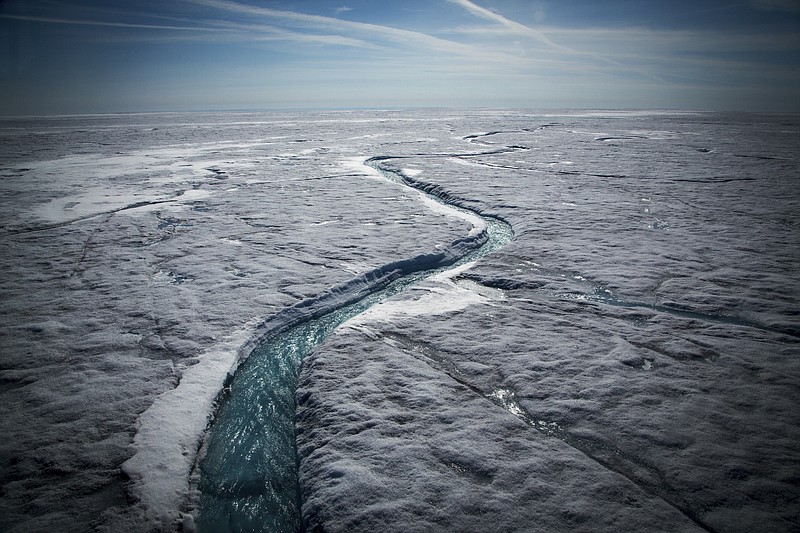The 50-year anniversary of the first detailed climate change warning issued to a U.S. president was Thursday.
And five decades later, here we are about a month away from a historic two-week climate negotiating session in Paris where delegates from more than 190 countries will convene to finalize an agreement meant to slow human influence on climate.
Meanwhile, the planet's surface has warmed about 0.85C (1.5F) since 1880, worsening floods, storms and deadly heat waves.
It's widely believed that the Paris talks won't result in changes and policies that will hold global warming to a magic number of less than a 2 C global temperature increase (3.6F), but climate negotiations experts say that won't automatically mean failure - or doom.
"It is a fundamental misinterpretation or misunderstanding of the complexity of what we're dealing with to even imagine that an agreement in Paris would in and of itself, at the turn of a dime, miraculously solve climate change," U.N. Framework Convention on Climate Change executive secretary Christiana Figueres told reporters earlier this year. "What Paris does is to chart the course toward that long-term destination."
Indeed, reality is a tough taskmaster. Even as we reduce emissions of carbon dioxide, we offset much of the reductions with growth and population increases. What's more, carbon dioxide, the greenhouse gas of greatest concern, accumulates in the atmosphere and remains there for centuries as it is slowly absorbed by plants and the oceans.
"Thus, even if global emissions could be reduced by a heroic average 20 percent from their 'business as usual' course over the next 50 years, we would be delaying the projected doubling of the concentration by only 10 years, from 2065 to 2075," according to Steven E. Koonin, director of the Center for Urban Science and Progress at New York University. Koonin, the under secretary for science in the Energy Department from 2009 to 2011 and a former chief scientist for BP, wrote a piece on carbon and the upcoming Paris meeting for the New York Times last week.
Unconditional national commitments made by countries for the Paris meeting are projected to reduce total greenhouse gas emissions through 2030 by an average of only 3 percent below the business-as-usual average rise of 8 percent. This is why drastic reductions would be needed to stabilize human influences on the climate at supposed "safe" levels, according to Koonin.
Add to that, humanity's propensity for not changing our habits (except to have more, more, more), and the fact of the matter is that we can't slow our emissions fast enough to make a difference. Energy demand, which is strongly correlated with rising incomes and living standards, is expected to grow by some 50 percent by midcentury, driven by economic progress in developing countries and by population growth to about 9.7 billion people from the current 7.3 billion, Koonin noted.
His bottom line is that we are left, then, with adaptation. Adaptation like raising sea walls and growing drought-resistant crops. And that will cost a lot, just as changing our energy habits will cost a lot. One New York Times commenter called Koonin's conclusion "close to immoral." Another said Syria "is in the middle of 'adaptation' right now."
Reuters reported last week that governments will raise $22 billion from carbon pricing this year - putting a price on carbon dioxide emissions such as taxes or emissions trading systems.
That's a lot of adaptation.
The intent of carbon pricing is to spur investment in low-carbon energy, but there is no requirement that the money must be spent on green energy.
"Revenues from carbon pricing appear likely to continue to increase around the world, and continuing debate will be needed about how these funds should best be used in future," according to a report by the Climate Markets and Investment Association.
The $22 billion figure is up 46 percent from an estimated $15 billion raised in 2014, according to the CMIA report. Three quarters of the money was raised in Europe, but some 40 nations and more then 20 cities, states and regions already have a price on CO2 emissions.
The Paris meetings also are not expected to set carbon pricing or rules for the revenues. So what then is the point?
The hope is that the Paris agreement will "build a process" that will be strengthened over time. If all goes according to the vaguely sketched climate negotiations master plan, governments would agree during future negotiations to further deepen their cuts to fossil fuel use, replaced with cleaner alternatives.
So, on this 50th anniversary of first detailed climate change warning issued to a U.S. president, we're still pretending that reality isn't real and that climate change is something happening somewhere in a galaxy far, far away.
